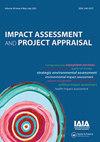Fallacies about communities that lead to failed community relations
IF 1.9
4区 社会学
Q3 ENVIRONMENTAL STUDIES
引用次数: 4
Abstract
ABSTRACT The assessment and implementation of development projects has been disconnected from relevant concepts in social psychology, especially those relating to understanding the interactions between projects and local communities. This disconnection has given rise to the prevalence of several fallacies about human behaviour amongst project staff, decision makers and environmental and social impact assessment practitioners. The playing-out of these fallacies influences the implementation of projects and reduces the likelihood of gaining a social licence to operate. Because these fallacies lead to distorted perceptions about communities, the existence of these fallacies is deleterious to desirable social relations with communities, good impact assessment practice, and to effective project decision-making. We describe eight of these fallacies: subjectivity; naiveté; unpredictability; irrationality; greediness; self-serving; aggressiveness; and rigidity. We discuss these fallacies by drawing on the social psychology constructs of attitudes, risk perception, social identity, and social justice. We conclude by considering how these fallacies can be addressed in practice and how development projects and impact assessment can be improved.关于社区的谬论导致了社区关系的失败
发展项目的评估和实施已经脱离了社会心理学的相关概念,特别是那些与理解项目与当地社区之间的相互作用有关的概念。这种脱节在项目工作人员、决策者以及环境和社会影响评估从业人员中引起了关于人类行为的几种谬论的流行。这些谬论的出现影响了项目的实施,并降低了获得社会经营许可证的可能性。因为这些谬论导致了对社区的扭曲认知,这些谬论的存在对与社区的理想社会关系、良好的影响评估实践以及有效的项目决策都是有害的。我们描述了其中的八种谬论:主观性;天真;不可预测性;非理性;贪吃的;自私的;攻击性;和刚度。我们从态度、风险感知、社会认同和社会正义的社会心理学结构来讨论这些谬论。最后,我们考虑如何在实践中解决这些谬论,以及如何改进发展项目和影响评估。
本文章由计算机程序翻译,如有差异,请以英文原文为准。
求助全文
约1分钟内获得全文
求助全文
来源期刊

Impact Assessment and Project Appraisal
ENVIRONMENTAL STUDIES-
CiteScore
4.60
自引率
22.70%
发文量
52
期刊介绍:
This is the international, peer-reviewed journal of the International Association for Impact Assessment (IAIA). It covers environmental, social, health and other impact assessments, cost-benefit analysis, technology assessment, and other approaches to anticipating and managing impacts. It has readers in universities, government and public agencies, consultancies, NGOs and elsewhere in over 100 countries. It has editorials, main articles, book reviews, and a professional practice section.
 求助内容:
求助内容: 应助结果提醒方式:
应助结果提醒方式:


